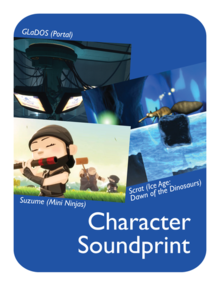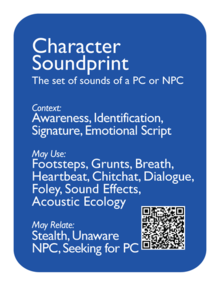Difference between revisions of "Character Soundprint"
From SoundInGames.com - Sound Design in Games
ValterAlves (Talk | contribs) m |
ValterAlves (Talk | contribs) |
||
| Line 20: | Line 20: | ||
[[Character Soundprint]] is a matter of great importance for disparate reasons: | [[Character Soundprint]] is a matter of great importance for disparate reasons: | ||
| − | *To start with, [[Character Soundprint]] is relevant for the sake of [[Awareness]]. That includes providing the sense of presence and signalling basic activity. With that purpose there is a set of | + | *To start with, [[Character Soundprint]] is relevant for the sake of [[Awareness]]. That includes providing the sense of presence and signalling basic activity. With that purpose there is a set of sound explorations that are consistently used, such as: |
** [[Footsteps]], definitely the most used; | ** [[Footsteps]], definitely the most used; | ||
** [[Grunts]], very common and effective in signalling efforts; | ** [[Grunts]], very common and effective in signalling efforts; | ||
** [[Breath]], usually just for the PC and reserved to conditions like enduring efforts or extreme emotional conditions; | ** [[Breath]], usually just for the PC and reserved to conditions like enduring efforts or extreme emotional conditions; | ||
| − | + | ** [[Sound Effects]], which depending on the type of character, may be pertinent in addition or in substitution of those elements (for instance, and imaginary or abstract character). | |
: Also, characters usually express themselves through a language, which may be actual [[Dialogue]] and/or more basic utterances (e.g. [[Shout and Yell]] or even simpler [[Grunts]]). | : Also, characters usually express themselves through a language, which may be actual [[Dialogue]] and/or more basic utterances (e.g. [[Shout and Yell]] or even simpler [[Grunts]]). | ||
| − | * | + | *Additionally, [[Character Soundprint]] may also be relevant in terms of [[Identification]], that is, to provide the means for the player to be able to distinguish between different types of characters. [[Identification]] may be instrumental in terms of [[Gameplay]], but also contributes for the [[Acoustic Ecology]]. [[Identification]] may be achieved through the design of disparate [[Signature]]s for those types of characters, by establishing some uniqueness in characters' soundprints. |
* In turn, a singular [[Characters Sounprint]] is can be explored to establish a memorable experience and brand; | * In turn, a singular [[Characters Sounprint]] is can be explored to establish a memorable experience and brand; | ||
Revision as of 23:32, 17 October 2011

|

| |
| The card's front face | The card's back face |
Contents
[hide]Synopsis
| The set of sounds of a PC or NPC. |
Relationships
Context:
Awareness ![]() , Identification
, Identification ![]() , Signature
, Signature ![]() , Emotional Script
, Emotional Script ![]() .
.
May use:
Footsteps ![]() , Grunts
, Grunts ![]() , Breath
, Breath ![]() , Heartbeat
, Heartbeat ![]() , Chitchat
, Chitchat ![]() , Dialogue
, Dialogue ![]() , Foley
, Foley ![]() , Sound Effects
, Sound Effects ![]() , Acoustic Ecology
, Acoustic Ecology ![]() .
.
May Relate:
Stealth ![]() , Unaware NPC
, Unaware NPC ![]() , Seeking for PC
, Seeking for PC ![]() .
.
Description
The Characters' Soundprint define their acoustic identity.
Character Soundprint is a matter of great importance for disparate reasons:
- To start with, Character Soundprint is relevant for the sake of Awareness. That includes providing the sense of presence and signalling basic activity. With that purpose there is a set of sound explorations that are consistently used, such as:
- Footsteps, definitely the most used;
- Grunts, very common and effective in signalling efforts;
- Breath, usually just for the PC and reserved to conditions like enduring efforts or extreme emotional conditions;
- Sound Effects, which depending on the type of character, may be pertinent in addition or in substitution of those elements (for instance, and imaginary or abstract character).
- Also, characters usually express themselves through a language, which may be actual Dialogue and/or more basic utterances (e.g. Shout and Yell or even simpler Grunts).
- Additionally, Character Soundprint may also be relevant in terms of Identification, that is, to provide the means for the player to be able to distinguish between different types of characters. Identification may be instrumental in terms of Gameplay, but also contributes for the Acoustic Ecology. Identification may be achieved through the design of disparate Signatures for those types of characters, by establishing some uniqueness in characters' soundprints.
- In turn, a singular Characters Sounprint is can be explored to establish a memorable experience and brand;
Examples






